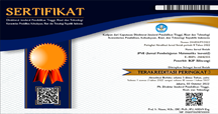ANALISIS PERSEPSI SISWA MADRASAH ALIYAH TERHADAP PEMBELAJARAN MATEMATIKA BERBANTUAN TEKNOLOGI PADA PJJ SELAMA PANDEMI COVID-19
DOI:
https://doi.org/10.22460/jpmi.v6i1.12899Keywords:
Perception, Technology-Assisted Learning, Distance LearningAbstract
This research is based on the important role of technology as one of the supporters of learning during the Covid-19 pandemic. The purpose of this study was to investigate the perceptions of madrasah students regarding technology-assisted mathematics learning, differences in perceptions between male and female students, students' perceptions when viewed from the indicators, and students' opinions on distance learning during pandemic. This study uses descriptive methods with quantitative and qualitative approaches to students of MAN 2 Kota Sukabumi class Xmathsci. on the academic year 2020/2021. The instruments used are closed questionnaires and written interview questions that has been validated. The data analysis technique used an interval approach determined by the Ideal Mean (Mi) and the Ideal Standard Deviation (SDi) to determine the category of perception as well as verbal analysis. The conclusion obtained is that students have positive perceptions regarding technology-assisted learning in distance learning, both male and female students have positive perceptions, and students' opinions about the distance learning that has been implemented are mostly the learning experiences are to use Google Classroom and then WhatsApp.
References
Al Rawashdeh, A. Z., Mohammed, E. Y., Al Arab, A. R., Alara, M., & Al-Rawashdeh, B. (2021). Advantages and disadvantages of using E-learning in university education: Analyzing students’ perspectives. Electronic Journal of E-Learning, 19(2), 107–117. https://doi.org/10.34190/ejel.19.3.2168
Alatubir, G., Rahman, B., & Sulistiawati. (2019). Pengaruh Model Pembelajaran Novick Terhadap Kemampuan Pemahaman Konsep Siswa SMP. UNION: Jurnal Pendidikan Matematika, 7(3), 437–451.
Anwar, W., & Wahid, J. H. J. (2021). Learners’ Perception on Online Learning Implementation During Covid-19 Pandemic. 9(2), 126–138.
Azwar, S. (2007). Tes Prestasi Fungsi dan Pengembangan Pengukuran Prestasi Belajar Edisi II. Yogyakarta: Pustaka Pelajar.
Bertiz, Y., & Karoğlu, A. K. (2020). Distance Education Students’ Cognitive Flexibility Levels and Distance Education Motivations To cite this article : Distance Education Students ’ Cognitive Flexibility Levels and Distance Education Motivations. International Journal of Research in Education and Science (IJRES), 6(4), 638–648.
Cakrawati, L. M. (2017). Students’ perceptions on the use of online learning platforms in EFL classroom. Journal of English Language Teaching and Technology, 1(1), 22–30. https://ejournal.upi.edu/index.php/ELTTech/article/view/9428
Cussó-Calabuig, R., Carrera Farran, X., & Bosch-Capblanch, X. (2017). Are boys and girls still digitally differentiated? The case of Catalonian teenagers. Journal of Information Technology Education: Research, 16, 411–435. https://doi.org/10.28945/3879
Das, K. (2019). Role of ICT for better Mathematics Teaching. Shanlax International Journal of Education, 7(4), 19–28. https://doi.org/10.34293/education.v7i4.641
Deiniatur. (2019). Deiniatur, The Use of E-Learning through Google | 114. The Use of E-Learning through Google Classroom to Improve Students’ Articulation Phonetic Ability, 4(2), 114–121.
Dumas, D. (2018). Understanding High School Students ’ Perceptions of Their Learning Opportunities : A Doubly Latent Approach. Frontiers in Education, 3(76), 1–21. https://doi.org/10.3389/feduc.2018.00076
Hakim, A. R., Sulistiawati, S., & Arifin, S. (2018). Hubungan Antara Kecerdasan Emosional Dan Motivasi Belajar Dengan Prestasi Belajar Matematika Siswa SMP. Teorema: Teori Dan Riset Matematika, 3(2), 165–176.
Honeyman, M., & Miller, G. (1993). Agriculture Distance Education: A Valid Alternative for Higher Education? Proceedings of the 20th Annual National Agricultural Education Research Meeting, 67–73.
Johnson, N. (2006). Boys and girls are the same: Gender perceptions in using computers in the classroom. Computers in New Zealand Schools, 18(3), 5–11, 33.
Joosten, T., & Cusatis, R. (2020). Online Learning Readiness. American Journal of Distance Education, 34(3), 180–193. https://doi.org/10.1080/08923647.2020.1726167
Kusumah, Y. S. (2019). Pembelajaran Berbasis Teknologi Informasi dan Komunikasi untuk Menghadapi Tantangan dan Permasalahan di Era Revolusi Industri 4.0.
Kusumah, Y. S. (2017). Inovasi Pembelajaran Matematika Berbasis Multimedia Untuk Meningkatkan Kemampuan Berfikir Matematis Siswa. Prosiding Seminar Nasional Pendidikan Matematika 2017, Program Studi Pendidikan Matematika FKIP-UNIKU, 1–18.
Lee, J. S., Cho, H., Gay, G., Davidson, B., & Ingraffea, A. (2003). Technology acceptance and social networking in distance learning. Educational Technology and Society, 6(2), 50–61.
Lin, C. Y. (2008). Beliefs about using technology in the mathematics classroom: Interviews with pre-service elementary teachers. Eurasia Journal of Mathematics, Science and Technology Education, 4(2), 135–142. https://doi.org/10.12973/ejmste/75313
Lizzio, A., Wilson, K., & Simons, R. (2002). University Students’ Perceptions of the Learning Environment and Academic Outcomes: implications for theory and practice. Studies in Higher Education, 27(1), 26–52. https://doi.org/10.1080/03075070120099359
Manowong, S. (2016). Undergradate Students’ Perception of Edmodo as a Supplementary Learning Tool in an EFL Classroom. Silpakorn University Journal of Social Sciences, Humanities and Arts, 16(2), 137–161. https://www.thaiscience.info/journals/Article/SUIJ/10984811.pdf
Mardapi, D. (2008). Teknik Penyusunan Instrumen Tes dan Non Tes. Yogyakarta: Mitra Cendekia Press.
Nasution, M. D., & Ahmad. (2021). Students’ perception on learning mathematic during the time of covid 19. Journal of Physics: Conference Series, 1778(1). https://doi.org/10.1088/1742-6596/1778/1/012036
Oduma, C., & Ile, C. (2014). ICT Education for Teachers and ICT Supported Instruction: Problems and Prospects in the Nigerian Education System. African Research Review, 8(2), 199. https://doi.org/10.4314/afrrev.v8i2.12
Park, S. Y. (2009). An analysis of the technology acceptance model in understanding University students’ behavioral intention to use e-Learning. In Educational Technology and Society (Vol. 12, Issue 3).
Rosidah, I. D., Hasanah, U., Nadya, & Sulistiawati. (2019). Analisis Problematika Peserta Didik Pada Mata Pelajaran Matematika Materi Relasi Dan Fungsi. Prosiding Seminar Nasional Penelitian Pendidikan Matematika (SNP2M) 2019 Universitas Muhammadiyah Tangerang, April, 56–62.
Salleh, S. M. (2021). Students ’ Perception on Interactive Learning in Enhancing Blended Learning Experiences. 13(4), 268–276.
Sanjaya, W. (2013). Strategi Pembelajaran Berorientasi Standar Proses Pendidikan. Jakarta: Kencana.
Shaharanee, I. N. M., Jamil, J. M., & Rodzi, S. S. M. (2016). The application of Google Classroom as a tool for teaching and learning. Journal of Telecommunication, Electronic and Computer Engineering, 8(10), 5–8.
Slametto. (2010). Belajar dan Faktor-Faktor yang Mempengaruhinya. Jakarta: Rineka Cipta.
Sukmawati. (2020). Implementasi Pemanfaatan Google Classroom Dalam Proses Pembelajaran Online di Era Industri 4.0. Jurnal Kreatif Online, 8(1), 39–46.
Sulistiawati, Kusumah, Y. S., & Dahlan, J. A. (2021). Penggunaan Information Communication and Technology (ICT) Tools dalam Mendukung Pembelajaran Matematika Interaktif. JPMI-Jurnal Pembelajaran Matematika Inovatif, 4(5), 1033–1054. https://doi.org/http://dx.doi.org/10.22460/jpmi.v4i5.p1033-1054.
Sulistiawati, S., Juandi, D., & Yuliardi, R. (2021). Pembelajaran Terintegrasi Stem Untuk Meningkatkan Literasi Matematis Mahasiswa Calon Guru Matematika Pada Perkuliahan Pra-Kalkulus 1. Teorema: Teori Dan Riset Matematika, 6(1), 82. https://doi.org/10.25157/teorema.v6i1.4727
Thoha, M. (2011). Perilaku Organisasi Konsep Dasar dan Aplikasinya. Jakarta: Rajawali Grafindo Persada.
Tinio, V. L. (2009). ICT in Education. In United Nations Development Programme Bureau for Development Policy. https://doi.org/10.4018/978-1-60960-048-8.ch005
Walgito, B. (2010). Pengantar Psikologi Umum. Yogyakarta: Andi Offset.
Downloads
Published
Issue
Section
License
Copyright (c) 2023 JPMI (Jurnal Pembelajaran Matematika Inovatif)

This work is licensed under a Creative Commons Attribution-ShareAlike 4.0 International License.
The author is responsible for acquiring the permission(s) to reproduce any copyrighted figures, tables, data, or text that are being used in the submitted paper. Authors should note that text quotations of more than 250 words from a published or copyrighted work will require grant of permission from the original publisher to reprint. The written permission letter(s) must be submitted together with the manuscript.
















